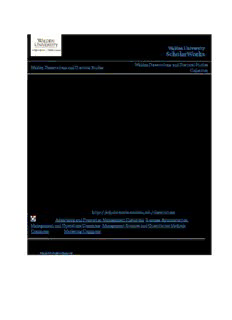
Marketing Strategies of Small Traditional Travel Agencies in a Technology-Driven World PDF
Preview Marketing Strategies of Small Traditional Travel Agencies in a Technology-Driven World
Walden University ScholarWorks Walden Dissertations and Doctoral Studies Walden Dissertations and Doctoral Studies Collection 2016 Marketing Strategies of Small Traditional Travel Agencies in a Technology-Driven World Charice Hayes Walden University Follow this and additional works at:https://scholarworks.waldenu.edu/dissertations Part of theAdvertising and Promotion Management Commons,Business Administration, Management, and Operations Commons,Management Sciences and Quantitative Methods Commons, and theMarketing Commons This Dissertation is brought to you for free and open access by the Walden Dissertations and Doctoral Studies Collection at ScholarWorks. It has been accepted for inclusion in Walden Dissertations and Doctoral Studies by an authorized administrator of ScholarWorks. For more information, please [email protected]. Walden University College of Management and Technology This is to certify that the doctoral study by Charice Hayes has been found to be complete and satisfactory in all respects, and that any and all revisions required by the review committee have been made. Review Committee Dr. Jorge Gaytan, Committee Chairperson, Doctor of Business Administration Faculty Dr. Erik Shefsky, Committee Member, Doctor of Business Administration Faculty Dr. Alen Badal, University Reviewer, Doctor of Business Administration Faculty Chief Academic Officer Eric Riedel, Ph.D. Walden University 2016 Abstract Marketing Strategies of Small Traditional Travel Agencies in a Technology-Driven World by Charice S. Hayes MS, Kaplan University, 2010 BA, Morgan State University, 1998 Doctoral Study Submitted in Partial Fulfillment of the Requirements for the Degree of Doctor of Business Administration Walden University December 2016 Abstract In 2012, there was a 70% increase in online travel booking, resulting in small traditional brick-and-mortar travel agencies having serious difficulties with obtaining and retaining customers. The purpose of this case study was to explore online marketing strategies that leaders of small traditional travel agencies have used to successfully obtain and retain customers. Technology disruption theory was the conceptual framework of this study. Using criterion sampling, the population for this study consisted of 3 leaders of small traditional travel agencies located in the state of Maryland. Data collection consisted of interviews, observations, and review of documentation, such as displays, websites, business cards, and email campaigns. Data were analyzed using methodological triangulation through inductive coding of phrases and words. The following 4 themes emerged: company threats, online marketing strategies, various marketing strategies for improvement, and ways to compete with Internet-based travel agencies. Results indicated that 66% of participants believed that Internet-based travel agencies were threats. All of the participants used a form of online marketing and believed that customer loyalty helped to compete with Internet-based travel agencies. Positive social change may result when leaders of small traditional travel agencies increase their knowledge of online marketing strategies to obtain and retain customers, thereby leading to greater access to online travel opportunities for all, including physically challenged individuals often confined to their living areas. Marketing Strategies of Small Traditional Travel Agencies in a Technology-Driven World by Charice S. Hayes MS, Kaplan University, 2010 BA, Morgan State University, 1998 Doctoral Study Submitted in Partial Fulfillment of the Requirements for the Degree of Doctor of Business Administration Walden University December 2016 Dedication I dedicate this study to those who had an instrumental hand with the progress and completion of this study. I would also like to dedicate this study to the memory of my nephew, Jeffrey Alan Matthews, Jr. Many thanks to my family and friends who have seen me work endlessly until I achieved this milestone. Thank you. Acknowledgments I would not have made it through this process without the grace of God. I would like to give thanks to God for giving me the strength to make it through this process. I would also like to thank my committee members, Dr. Jorge Gaytan, Dr. Erik Shefsky, and Dr. Alen Badal, for their professional guidance. Table of Contents List of Tables ..................................................................................................................... iv List of Figures ......................................................................................................................v Section 1: Foundation of the Study ......................................................................................1 Background of the Problem ...........................................................................................2 Problem Statement .........................................................................................................3 Purpose Statement ..........................................................................................................3 Nature of the Study ........................................................................................................4 Research Question .........................................................................................................5 Interview Questions .......................................................................................................5 Conceptual Framework ..................................................................................................7 Operational Definitions ..................................................................................................8 Assumptions, Limitations, and Delimitations ................................................................8 Assumptions ............................................................................................................ 8 Limitations .............................................................................................................. 9 Delimitations ........................................................................................................... 9 Significance of the Study ...............................................................................................9 A Review of the Professional and Academic Literature ..............................................10 Concept of Small Business ....................................................................................13 Disruptive Innovation ...........................................................................................16 Marketing Strategies of Small Businesses ............................................................17 Market-Driven Strategies ......................................................................................23 i Marketing Mix .......................................................................................................23 Traditional Travel Agencies ..................................................................................26 Disruption or Marketing Mix? ...............................................................................31 Traditional Travel Agency Marketing ...................................................................34 Travel Distribution Channel ..................................................................................39 Transition and Summary ..............................................................................................41 Section 2: The Project ........................................................................................................43 Purpose Statement ........................................................................................................43 Role of the Researcher .................................................................................................44 Participants ...................................................................................................................46 Research Method and Design ......................................................................................47 Research Method .................................................................................................. 47 Research Design.................................................................................................... 49 Population and Sampling .............................................................................................51 Ethical Reasearch .........................................................................................................54 Data Collection Instruments ........................................................................................55 Data Collection Technique ................................................................................... 57 Data Organization Techniques .............................................................................. 58 Data Analysis ...............................................................................................................59 Reliability and Validity ................................................................................................61 Reliability .............................................................................................................. 61 Validity ................................................................................................................. 62 ii Transition and Summary ..............................................................................................64 Section 3: Application to Professional Practice and Implications for Change ..................65 Introduction ..................................................................................................................65 Presentation of the Findings.........................................................................................65 Theme 1: Company Threats .................................................................................. 66 Theme 2: Online Marketing Strategies ................................................................. 68 Theme 3: Various Marketing Strategies for Improvement ................................... 73 Theme 4: Ways to Compete with Internet-Based Travel Agencies ...................... 75 Applications to Professional Practice ..........................................................................80 Implications for Social Change ....................................................................................82 Recommendations for Action ......................................................................................84 Recommendations for Further Study ...........................................................................85 Reflections ...................................................................................................................85 Conclusion ...................................................................................................................86 References ..........................................................................................................................88 Appendix A: Appendix C: Interview Protocol ................................................................118 Appendix B: Document Review Protocol ........................................................................120 Appendix C: Observation Protocol ..................................................................................121 iii
Description: